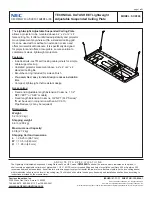
For technical help, questions or comments concerning this
product or any ETI product contact Customer Service 8:00 a.m. -
5:00 p.m. Eastern Time.
[email protected]
networketi.com
ETI
1850 North Sheridan Street
South Bend, IN 46628
Email:
Web:
Mail:
CONTACTING CUSTOMER SERVICE
ETI’s two year limited warranty covering defects in workmanship
and materials applies. Contact Customer Service for complete
warranty information.
LIMITED WARRANTY
ETI makes no representations or warranties, either expressed or
implied, with respect to the contents of this publication or the
products that it describes, and specifically disclaims any implied
warranties of merchantability or fitness for any particular
purpose. ETI reserves the right to revise this publication, and to
make changes and improvements to the products described in
this publication, without the obligation of ETI to notify any person
or organization of such revisions, changes or improvements.
DISCLAIMER
4
Before putting the new humidity sensor on the tie wrap
mounts, connect the two leads from the new humidity
sensor. Reversing the process in step 6, push in on either
orange release tab then insert either humidity sensor
lead into that terminal. It does not matter which lead
goes to which terminal. Release the tab to secure the
lead. Repeat this process for the other lead. Tug gently
on each lead to make sure it is firmly connected.
Place the new humidity sensor onto the two tie wrap
mounts from which the original assembly was removed.
Before securing the new humidity sensor in place, rotate
the sensor on the two mounts so that the two air hoses
reach their respective 90° and straight fittings. The
longer hose is the Air Out hose and connects to the
lower or straight fitting.
The shorter hose is the Air In hose and connects to the
upper or 90° fitting. There is no right or wrong angle for
the humidity sensor itself in terms of function. All that
matters here is that both air hoses reach and connect
securely to the two sensor fittings.
Once the angle of the humidity sensor is determined
based on the position of the fittings to the hoses, secure
the new humidity sensor in place by feeding the two tie
wraps from the kit through the slot in each mount,
knurled side up, wrap the tie wraps together, then cut off
the excess from each tie wrap.
Reconnect the “Y” section of the tubing assembly which
runs to the evaporator tray and which was disconnected
in step 3.
As described in the Note on page 3, if any components
were moved or removed for better access to the
humidity sensor, replace them in their original location
and position at this time. Restore all connections. When
connecting the three electrical leads to the power filter
module on AC units, make sure to connect them to the
same terminals from which they were removed.
Reinstall the top panels using the hardware removed in
Step 2.
Restore machine power.
7.
8.
9.
10.
11.
12.
13.
HUMIDITY SENSOR ASSEMBLY REPLACEMENT PROCEDURE | PART NO.
24104
REV
B.0
HUMIDITY SENSOR ASSEMBLY
REPLACEMENT PROCEDURE
MODEL ADH






















